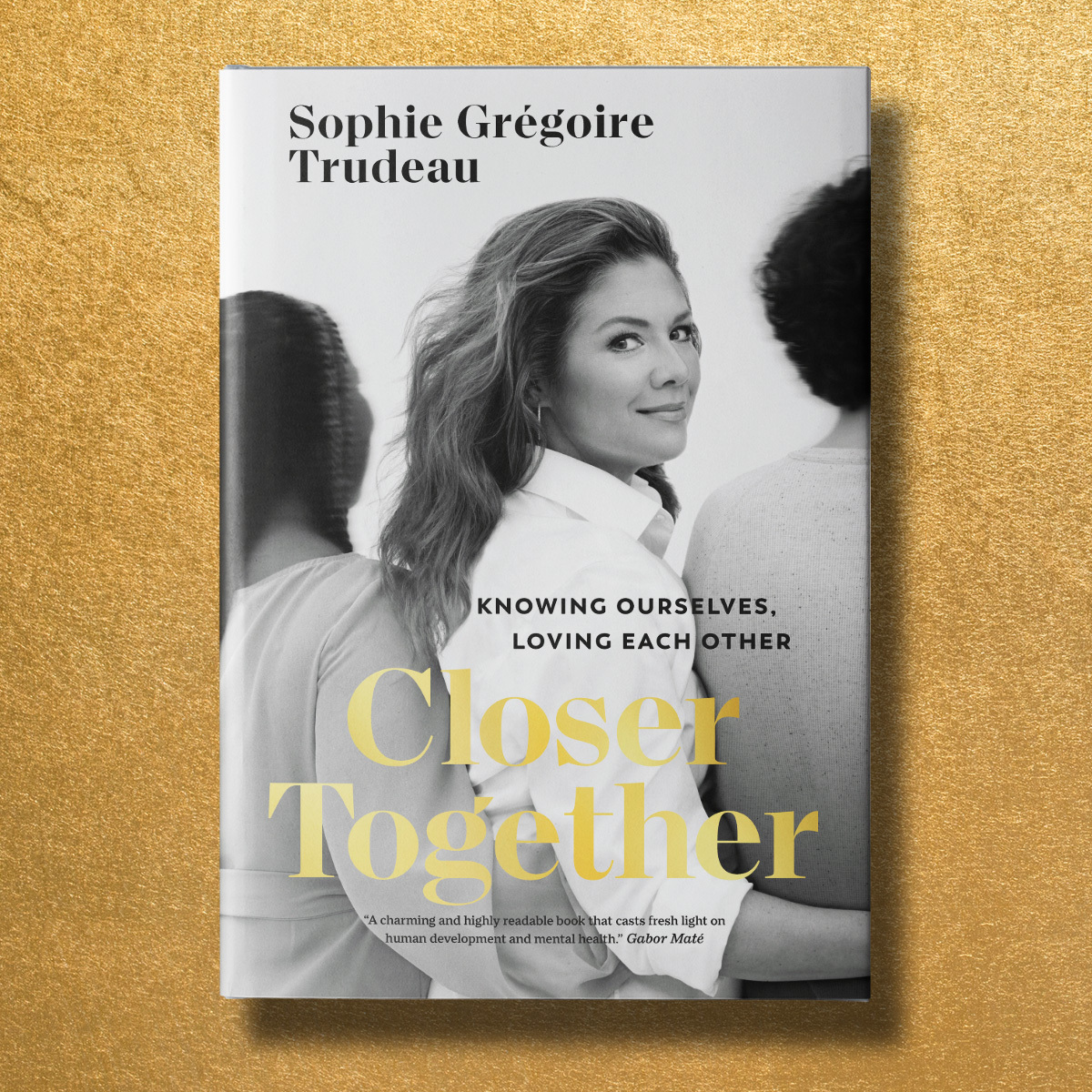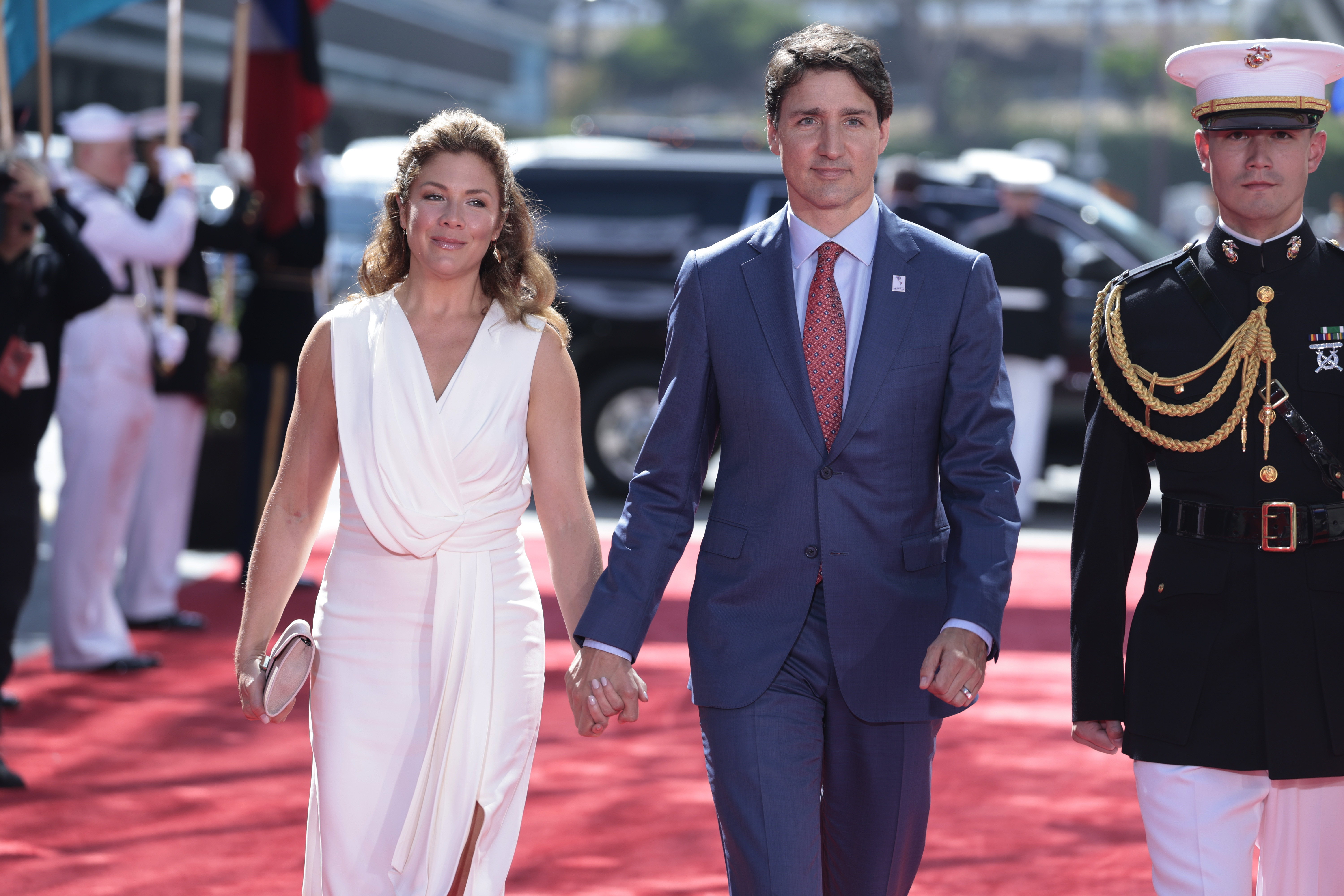
Early in chapter one of her new book Closer Together: Knowing Ourselves, Loving Each Other, Sophie Grégoire Trudeau addresses the elephant in the room. “Sometimes I’d be asked if I was ‘Trudeau’s wife,’” she writes, referring, of course, to Justin Trudeau, Prime Minister of Canada since 2015 and her husband since 2005. (After 18 years of marriage and three children together, they announced their separation last August—but more on that in a moment.) She continues that when approached in that manner, she “usually responded with a grin: ‘Well, actually, I’m Sophie—pleased to meet you!'"
She adds: "While that typically elicited a giggle, what I always hoped for was a more profound connection.”
That desire for a "more profound connection," both with herself and with others, forms the basis of Closer Together, out April 23. Coincidence or not, the book—best described as a self-help book told through an autobiographical lens, where Grégoire Trudeau is learning more about herself and inviting readers to do the same—comes out just one day before she turns 49 years old. To say much has changed since her last birthday is an understatement: She and Trudeau separated just eight months ago, allowing Grégoire Trudeau to step into this next year of life not billed first and foremost as someone’s wife. (Those who open the pages of Closer Together looking for details of marital collapse will leave disappointed—the book was written before their separation.)
Now, Closer Together serves as a reclamation of sorts of Grégoire Trudeau's career as a broadcaster (her work before becoming a political spouse), where she interviewed people for a living with aplomb. In the book, she does just that, telling her story—from her battles with an eating disorder to motherhood and marriage in the public eye—interspersed with interviews from thought leaders, psychologists, scientists, and celebrities.
"I love interviewing people," she tells Marie Claire. "To be honest, it’s a little bit more fulfilling and nourishing for me to interview than to get interviewed.” Though she’s spent most of the past decade serving as Canada’s de facto First Lady, “I’ve never stopped interviewing people,” she says. “I’ve interviewed people from all walks of life, from Malala [Yousafzai] to people who are not known by the world who are doing incredible work. In the past 10 years, I just did it on a volunteer basis in the context of the path that I was on—but I never really stopped.”
In this next chapter, mental health advocacy is emerging as the work of her life. “I’ve been on a mental health path for more than 20 years now, and when I shared my experience, it changed the course of my life,” she says. (As a young radio and television host in Quebec 20 years ago, Grégoire Trudeau spoke out about her eating disorder and considered it a turning point in her life.) Of her path forward, she says, “It’s no coincidence I’m choosing the mental well-being path, the conscious living path.”
As she steps out of the shadows of what was once referred to as Canada’s version of Camelot—rendering Grégoire Trudeau the celebrated Jackie Kennedy figure—she writes, relatably, about “fumbling toward my purpose.” She is grappling with her place in this world, unfurling from a long-term power couple into a woman standing confidently on her own, and doing so in the blinding light of the public eye.
“I never believed that I’m famous or a celebrity,” she says. (With a friend circle that includes the likes of Meghan Markle—who welcomed her as a guest on her 2022 podcast, “Archetypes”—like it or not, Grégoire Trudeau is famous.) “I think when you start believing in your titles or in your fame or whatever, you’re doomed. It’s a very negative path to go down.”

In her next act, Grégoire Trudeau wants to use her platform for good: to "expand my capacity to serve, to be able to connect as much as possible with human beings,” she explains. More than “Trudeau’s wife,” or First Lady, or one-half of the Canadian Camelot, “I’m not a role,” she says. “I’m not a title. None of us are. It’s about how similar we are. People might not see that at first glance, because they see pictures and how I’m dressed at a couple of events a year that should be representing my life—that’s completely erroneous.” Instead, she insists: “I make mistakes. I get up. I fall again. I get back up. I am courageous. I want to be brave, and being brave also means being vulnerable.”
The book is but one chapter of the still unfolding story of Grégoire Trudeau at 49 and beyond. There’s another book, actually, on its heels, this one to be released in 2025 and written for kids, specifically about connecting to their emotions through activity and interactions with nature. Grégoire Trudeau also launched a communications company, Under Your Light Communications, where she offers services as a communications specialist. “I’m trying to focus my attention to the work that needs to be done right now,” she says. “I love it so much that it doesn’t feel like work, to be honest."
The work that became Closer Together, she says, was born of her desire for "people to feel, bottom line.” While she admits that “not every day is a perfect one,” she says “I love life so much that I want people to be as in love and as nourished and as inspired, because they are worthy of it. And I want people to feel that they are worthy of being nourished and validated and loved for who they are. That’s what I want.”
When asked about how she feels about being worthy of those things, even and especially as she navigates this season of change, Grégoire Trudeau lets loose an uproarious laugh. "I have learned to accept that, yes,” she says.







